Why purpose-led businesses must tell their stories
In 2014, I attended my first ‘purpose’ workshop with a wonderful bunch of colleagues at Unilever’s Four Acres Leadership Retreat in Kingston, England. The entire week flew by as we immersed ourselves in listening to and sharing our life stories. These ultimately gave shape to each one’s unique purpose, which we penned as an outcome of the workshop. While we knew each other as colleagues, what made the week unforgettable were the personal, honest stories that made us truly connect and commit to supporting each other in the future.
We already know and buy the brands, but knowing their stories is what engages and commits us, rather than being a casual buyer who could be tempted away by the next enticing product.
What makes great purpose stories?
Many great brands and businesses start with a purpose. A purpose that goes beyond products, profit margins, and market share. There is often an inspiring narrative underlying the journey of these businesses—origin stories imbued with deep conviction and belief to make a positive difference to people and this world. When their stories are shared widely, people are deeply stirred and motivated to join their cause.
A few examples are Allbirds ‘Making things from natural materials in an industry obsessed with plastic’, Who Gives a Crap ‘Making each eco-friendly roll from natural and sustainable bamboo', and Too Good To Go ‘Empowering and inspiring people in the fight against food waste together’.
Why tell your purpose story?
When confronted by choices, people seek an authentic voice that resonates with their beliefs and one they can trust. Brands that consistently live their purpose through their actions and communicate in a voice and tone that deeply resonate with people draw them into their journey. These brands aren’t afraid to take a stance, to stand tall, and to fight for what matters. They inspire us and make our world safer, better, and more inclusive. Their purpose stories create an emotional bond with us that transcends a classic brand-consumer relationship.
Purpose stories also motivate employees
Purpose stories don’t only resonate with consumers. They are a powerful employee motivator, giving them a sense of purpose to get out of bed each morning and bring their best and authentic selves to work. They unite and commit people to an overarching mission. This inevitably has an influence on how people experience the brand and its offerings. As per the Academy to Innovate HR, 82% of US workers say that it's important for a company to have a purpose.
So, how do you tell great stories?
1. Dig out and embrace your history
As business leaders and people in a business change, stories get lost in the backyards of an organisation’s history. Great brands try not to forget their stories. They dig out their origin stories to understand what made them great, often evolving to make the founders’ stories their own, and share them with pride. Patagonia's purpose originated from the vision of its founder, Yvon Chouinard, who bravely pivoted his highly successful climbing equipment business when he realised their gear was an environmental villain because it was damaging the rocks. The company moved to aluminium chocks that could be wedged by hand rather than hammered in and out of cracks.
| This fundamental shift in the early 1970s became a cornerstone of Patagonia’s identity and commitment to environmental responsibility. Over the years, as the business pivoted several times, the core sustainability values remained intact, acting as a guiding beacon for all decisions. Patagonia’s brand mission, ‘We're in business to save our home planet’ has a story that proud Patagonians tell, inspiring a followership/followers of a different order. | 
patagonia.com |
2. Don’t be afraid to keep your great product at the centre of your story
Another wonderful purpose brand, Ben & Jerry, has a long-standing commitment to social justice and sustainability. Ben & Jerry's Foundation was established in 1985 with a gift from founders Ben and Jerry and 7.5% of the company's annual pre-tax profits to fund community-oriented projects
| While the company is a vocal activist for several causes, at the forefront of its storytelling is the love for ice cream, anchored in the belief that ice cream can change the world. The company’s social mission story is an inextricable part of its product mission: to make fantastic ice cream that people simply love. “We love making ice cream, but using our business to make the world a better place gives our work meaning.” | 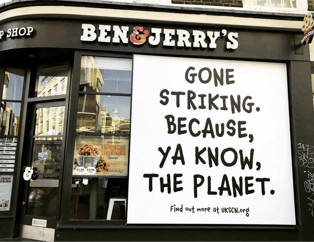
Photo courtesy of Ben & Jerry's |
3. The tone is important
Be sincere, down to earth, stylish, and humorous too! Being responsible is a serious matter, but you don’t need to take yourself seriously.
|
Tony Chocolonely is on a mission to make the chocolate industry ‘slave free’. The shape of its chocolate bar and the inside pack wrapper all tell this story. The tone at the same time is light and conversational, building a fan following for a delicious product on a serious mission: “Crazy about chocolate, serious about people." |
|
4. Let competition follow; after all, imitation is the best form of flattery
|
Taking Tony Chocolonely’s example forward, the company urges and pokes competitors to follow its mission. After all, to bring about big change, it takes one leader and many followers. "Alone, we’ll make slave-free chocolate, but together, we can make all chocolate slave-free. So, we ask you to join us." The ‘You’ is a propelling force for consumers, retailers, suppliers, competitors, et al!
|
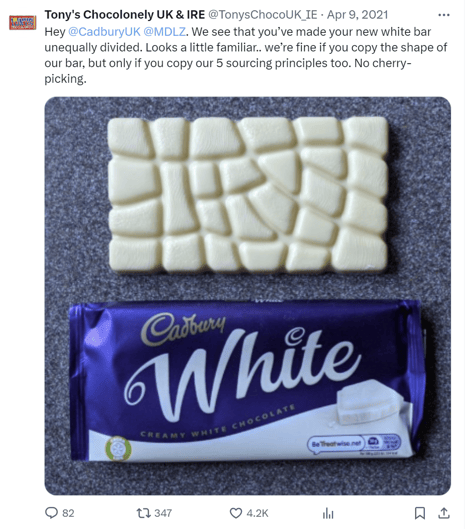
Tony's Chocolony X |
5. Don’t forget your B Corp certification – make it matter.
B Corp not only has an inspiring purpose story to tell but also has a certification that honours the credibility of their stories. This isn’t a one-off certification. It’s got to be earned painstakingly, year after year. However, even amongst an aware group of consumers (50% of 18-34 year olds), there is a real lack of understanding of what it encompasses.
|
Be proud to tell and promote the B Corp story alongside your own story. Simplify and educate people on what this means. Be consistent in using the symbol on products, marketing materials, posts, and blogs as a powerful signpost and reminder. As a B Corp, we at Oxford have the honour of working with some incredible purpose-led businesses and B Corps. We love helping them tell their wonderful stories in a way that people love to listen to. The real winners in the landscape of tomorrow will be those brands that inspire people with their purpose stories, with their beliefs, and with their actions towards something greater.
|
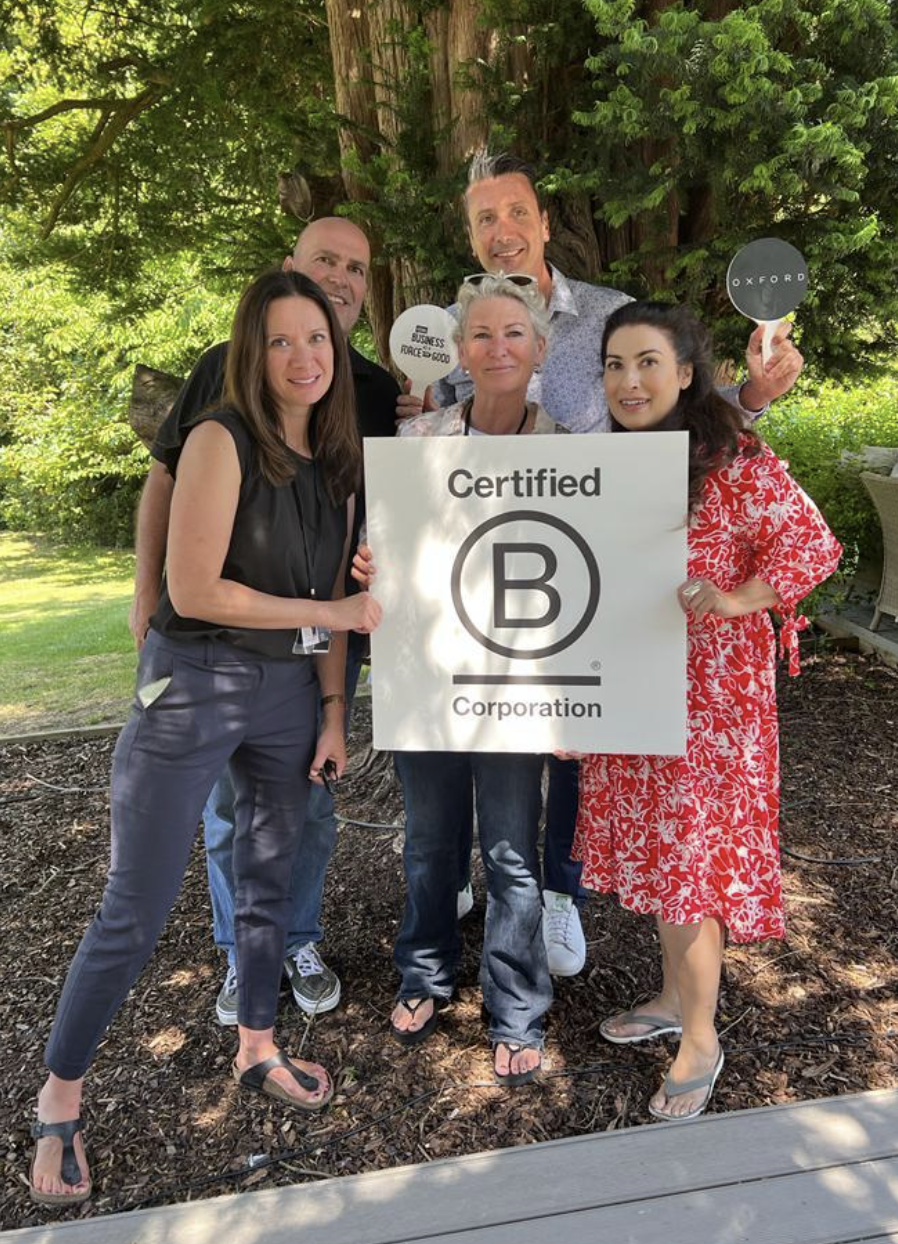
Oxford |
Sources
https://www.leeroy.ca/en/collections/why-is-storytelling-crucial-when-marketing-to-millennials/, https://www.fullsurge.com/blog/four-transformative-powers-of-brand-storytelling#:~:text=Research%20has%20proven%20that%20consumers,defining%20characteristics%20of%20our%20species, B Corp certified companies to know in the UK and what the certificate means | The Independent, https://www.forbes.com/sites/dianewiniarski/2023/06/01/purpose-driven-organizations-foster-employee-retention-and-more/, https://www.independent.co.uk/extras/indybest/b-corp-certification-uk-companies-b2014626.html
Websites
Patagonia, Ben & Jerry, Tony Chocolonely, Too Good to Go
About the author
I am driven by the urgency to build businesses with purpose that will have a lasting impact on the health of the world. I have spent over 30 years leading transformational strategy and marketing work at P&G, Pernod Ricard, Pepsico & Unilever, taking many a road less travelled.
I thrive when helping diverse teams to achieve their full potential. There’s much to be done. Let’s make it happen!

Share this
You May Also Like
These Related Stories

How to bridge the ‘Say - Do’ gap to make sustainable options stick

What is a B Corp and why did Oxford become one?
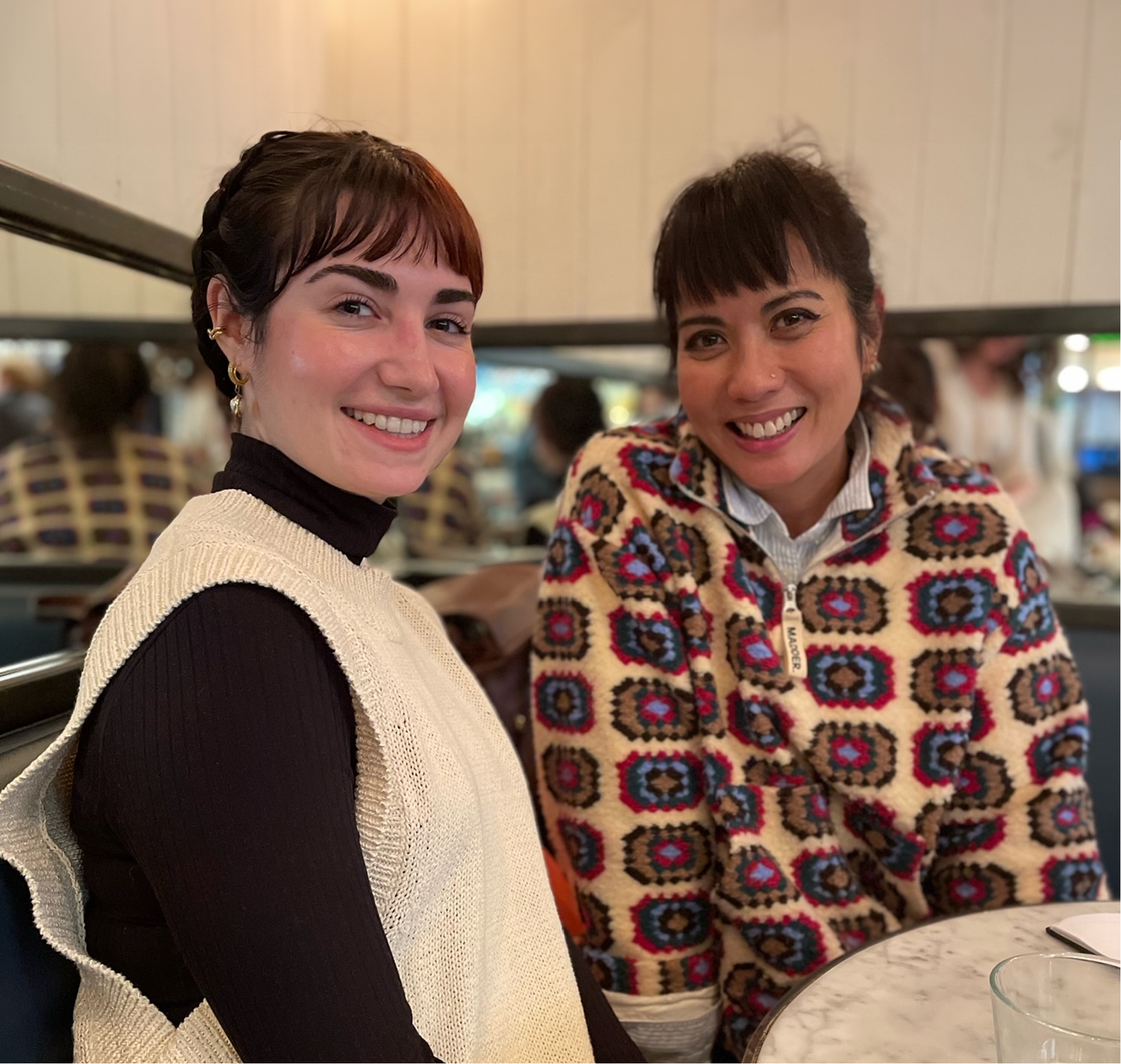
.png?width=657&height=57&name=OXFORD%20LOGO%20(1).png)
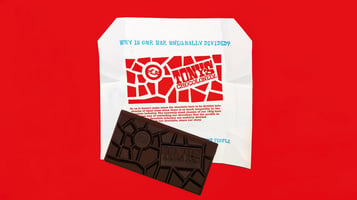
No Comments Yet
Let us know what you think